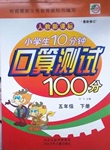题目内容
The illness of her son is so that she cannot go to sleep at night.
A.satisfying B.worrying C.surprising D.puzzling
B
解析:
略

练习册系列答案
 小学生10分钟口算测试100分系列答案
小学生10分钟口算测试100分系列答案
相关题目
______ the illness pneumonia, Jackson couldn’t go on teaching.
| A.As a result | B.As the result |
| C.As result of | D.As a result of |